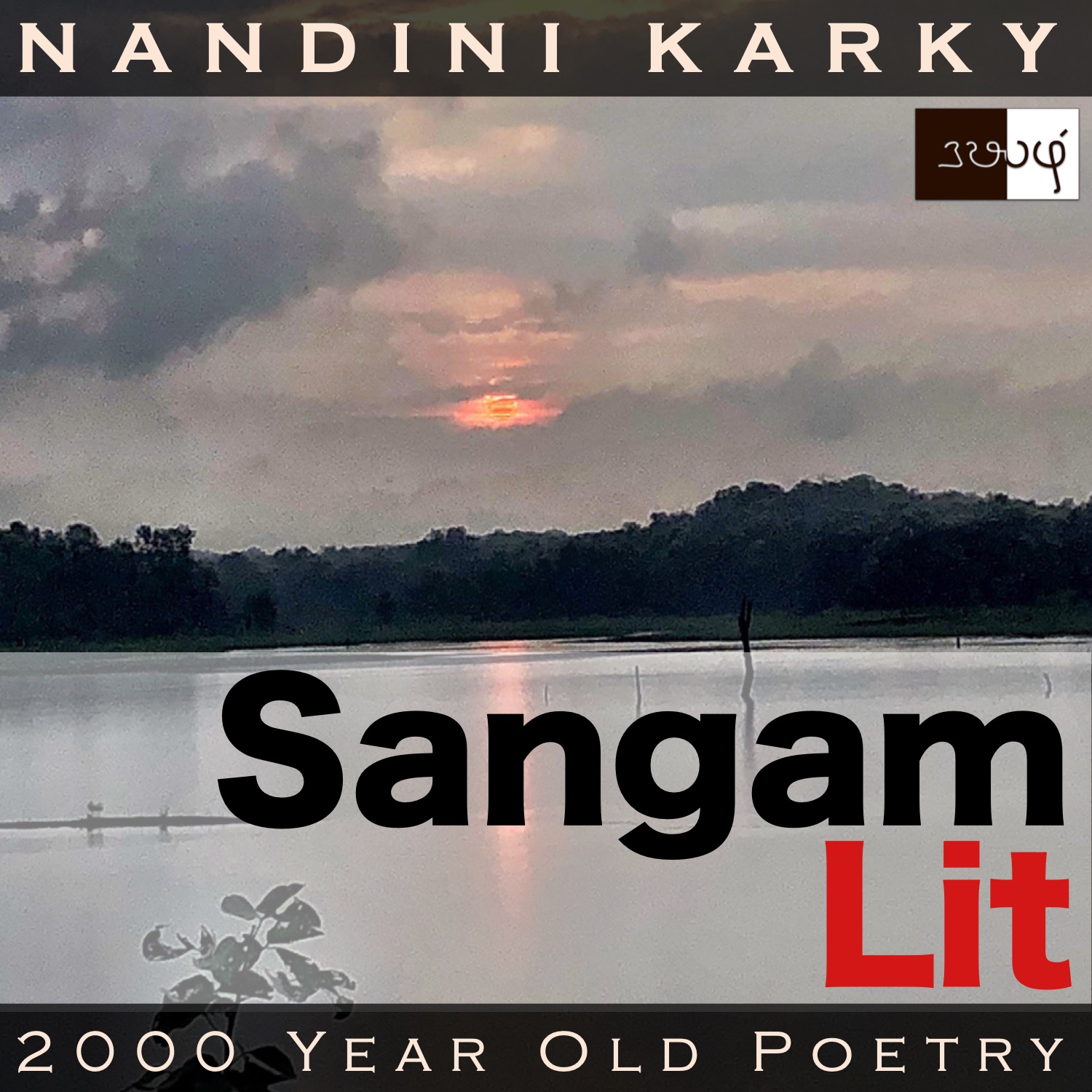Podcast: Play in new window | Download
Subscribe: Apple Podcasts | Spotify | Amazon Music | Android | iHeartRadio | TuneIn | RSS | More

In this episode, we empathise with the feelings portrayed in Sangam Literary work, Natrinai 152, penned by Alamperi Saathanaar. Set in the coastal regions of the ‘Neythal’ landscape, the verse speaks in the anguished voice of a man, relating his pained state, as the confidante listens nearby.
மடலே காமம் தந்தது, அலரே
மிடை பூ எருக்கின் அலர் தந்தன்றே,
இலங்கு கதிர் மழுங்கி எல் விசும்பு படரப்
புலம்பு தந்தன்றே புகன்று செய் மண்டிலம்,
எல்லாம் தந்ததன் தலையும், பையென
வடந்தை துவலை தூவ, குடம்பைப்
பெடை புணர் அன்றில் உயங்கு குரல் அளைஇ
கங்குலும் கையறவு தந்தன்று,
யாங்கு ஆகுவென் கொல்? அளியென் யானே.
A little gem of a poem that opens with ‘மடலே’, in reference to ‘madaleruthal’, a Sangam-era ritual that involves a man riding a palm horse and making his unrequited love public. The word ‘அலர்’ is used in two different meanings within this verse. One, meaning ‘gossip’ and the other, ‘a flower’ as in ‘எருக்கின் அலர்’ meaning ‘the flower of a milkweed’. ‘எல் விசும்பு படர’ talks about how ‘light spreads on the western sky’ in a poetic reference to the sunset. The phrase ‘பையென’ referring to ‘gently’ still echoes two thousand years later in the southern districts of Tamilnadu with the quaint word ‘பைய’. The word ’வடந்தை’ refers to ‘winds from the north’ and ‘துவலை’ refers to the ‘drizzle’ that accompanies these winds. Next, we glimpse at ‘குடம்பை’ or ‘nest’, a possible originator of the word ‘குடம்பம்’ or ‘family’. ‘அன்றில்’, the ‘red-naped ibis’, a bird that seems to be a Sangam favourite makes an appearance in this verse, along with its inseparable ‘பெடை’ or ‘female’. The word ‘கையறவு’ talks about ‘a sense of helplessness’. Let’s understand the story behind this man’s anguish.
The man has seen a lady and fallen in love with her. In order to win her affection, it was custom for the suitors to gain the friendship of the lady’s confidante. Even after repeated attempts, the man makes no headway in his mission to befriend the confidante. One day, seeing the confidante nearby, the man speaks as if to himself saying, “Love has given me, a palm horse; Gossip has given me, a garland intertwined with the milkweed flower; Its radiant rays now diminishing, as light spreads on the western sky, the life-giving sun has given me loneliness; On top of all this, gently as the northern wind scatters raindrops, as the ‘andril’ bird that mates with its female in the nest cries aloud in a stirring note, this night gives me helplessness! What will become of me? Pitiable indeed, I am!” With these words, the man expresses the deep sorrow in his heart, hoping to earn the confidante’s sympathy and also, making a hidden request to help him win the lady’s affection.
In a world of constant distraction, many of us have forgotten the art of listening! Through this poem, let’s take up that challenge and truly listen. The man talks about all the so-called gifts he has received in the days past. In a dejected voice, he talks about how his love for the lady has resulted in the humiliating fate of having to ride a horse made of palm leaves, leaving behind his dignity. Then, he mentions how the wagging tongues in the town has given him the gift of a garland made of weed flowers, which is part of the ‘madaleruthal’ ritual. His eyes then turn to the skies above and he describes how the sun is diminishing and the light is diffusing across the western sky. He says the sun, which makes all life possible, has given him the gift of loneliness just then. As twilight fades and night treads into the scene, the drizzle of a cold, northern wind touches the man’s skin and just then, the birdsong of an ‘andril’ bird, cuddling with its female, falls on his ears. This takes the man to the peak of his suffering, a feeling of utter helplessness and all he can do is cry out aloud at his pitiable state, wondering how he could ever face all that misery!
The highlight of this song is the inherent acceptance of a man’s expression of pain. In a society where there are traces of toxic masculinity, where a man being open with his feelings is frowned upon, it’s heartening to see how millennia ago, this same society acknowledged and accepted sensitive emotions in a man. When in agony, instead of reining it all in and suffering wordlessly, psychology tells us that expressing it out aloud relieves the suffering somewhat. When we find the words to describe the hurt, we acknowledge what’s happening within. In this verse, the man points to all the objects in the world around that hurt him in that moment and through that, he takes the pain within and releases it into the world. Another striking aspect is how the extreme state of misery, is not sorrow or tears but a feeling of being unable to do anything about that. The human mind always yearns to work out a solution and is most miserable when things are out of its hands. In the man’s case, whether the confidante heeds to his words or not, the mere expression would alleviate his pain, for what better therapy can there be to a wounded soul, other than the expression of feelings within.




Share your thoughts...